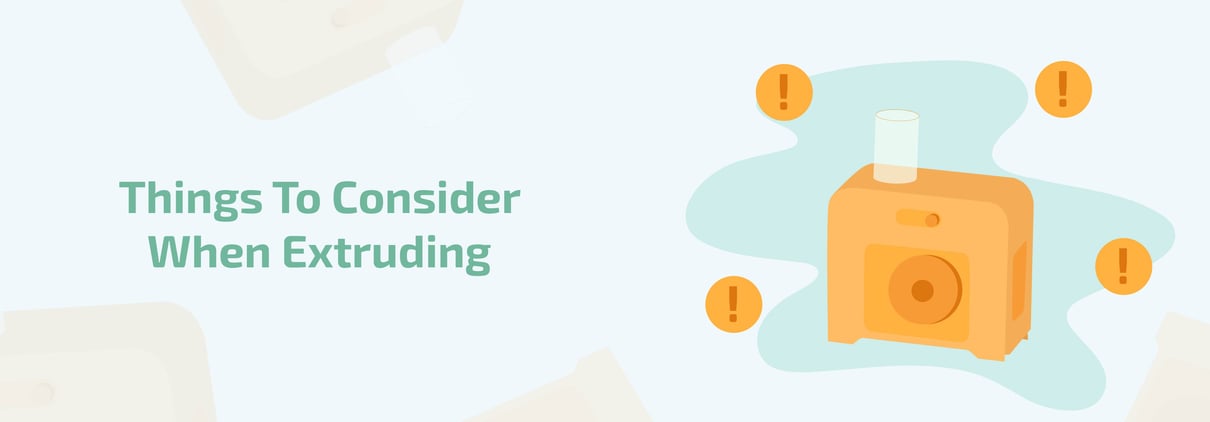Share this
Things To Consider When Extruding
by 3devo on Apr 30, 2020 11:42:00 AM

The step we’ve all been waiting for – extruding the plastic waste we have collected. Before you start to actually extrude your plastics, it is important to take things into consideration. In this blog, we will discuss all the steps you should consider/take beforehand.
In our previous blog post, we went over a seven-step guide on how to shred your plastics. If you missed it, we recommend you checking that out first before continuing on with this blog, as it is an important step to first shred your plastics correctly.
If you are not aware of what an extruder is or how it actually works, you can watch our “meet the 3devo filament maker” video in which we explain it all.
What To Consider
Now that we all know which plastics are and are not recyclable, how we can shred our plastics, what an extruder is and how an extruder works – we can move on in taking the right measures in order to extrude our plastic waste correctly and safely
Zero Contaminants
For starters, it important to make sure that your shredded plastic waste is dust and liquid-free. If your plastic waste still consists of some moisture, you should consider drying them first, or else you could expect to get failed filament. You can dry your shredded plastic waste by using an oven or a polymer dryer, like the one we have for example.
Melting Temperature Settings
Once your shredded plastic waste is ready to be used, you need to shift your focus on getting the right temperature settings in order to be able to melt your material well. If you are not sure at what temperature your material will melt, you can check our polymer pyramid page out which consists of material property guides that you can download for free. You can also always contact our material experts when you are not sure on which temperature settings to use.
Filament Cooling
Besides having the right temperature settings it is important to also have the right cooling settings, as it needed to have the right settings to get the desired filament shape. Luckily, our filament extruder already has some preset settings which you can select to get the shape you would like. If you are using an extruder that does not have some already preset settings, you should consider carrying out some tests with your shredded plastic waste in order to find the right settings for your machine.
Proper Ventilation
Another thing that is very important and that people usually don’t put a lot of thought to is to make sure that you have good ventilation going on. When extruding materials a lot of toxics could get released which could be bad for your health when inhaling it. We personally have made an in-house fume hood, which can be seen in the video below. The fume hood makes sure that all the toxics that could be released are trapped in and not aired out towards us. A little side note – our engineers are working on a guide on how you can build your own fume hood at home.
Lastly, keep in mind that when extruding it’s all about experimenting, testing, sometimes failing and experimenting some more. Even our material experts, with years of experience, face difficulties with finding the right settings for certain materials. Extruding filament is all about trial, error, and having some fun. Don’t be too harsh on yourself when you don’t extrude the perfect filament right away!
Now that you know all the things you should consider before extruding filament, you can get started on the extruding process. If you don’t own a filament maker yet and are looking to invest in one, you can use our desktop extruder guide to compare extruders that fit you best.
We hope that this blog helped you to get further in your recycling process and we are looking forward to seeing you back next week, where we will actually 3D print with the filament we made.
Until next week!
Share this
- November 2025 (1)
- October 2025 (1)
- March 2025 (1)
- January 2025 (1)
- December 2024 (2)
- November 2024 (2)
- October 2024 (4)
- September 2024 (2)
- August 2024 (3)
- July 2024 (6)
- June 2024 (3)
- May 2024 (2)
- April 2024 (1)
- March 2024 (1)
- January 2024 (1)
- November 2023 (2)
- October 2023 (5)
- September 2023 (2)
- August 2023 (1)
- July 2023 (1)
- May 2023 (1)
- December 2022 (2)
- June 2022 (1)
- May 2022 (2)
- April 2022 (2)
- March 2022 (6)
- February 2022 (2)
- January 2022 (3)
- December 2021 (3)
- November 2021 (3)
- October 2021 (2)
- September 2021 (3)
- August 2021 (3)
- July 2021 (2)
- June 2021 (1)
- March 2021 (1)
- October 2020 (1)
- June 2020 (1)
- May 2020 (1)
- April 2020 (4)
- November 2019 (1)
- July 2019 (2)
- June 2019 (1)
- May 2019 (1)
- March 2019 (1)
- November 2018 (1)
- September 2018 (1)
- January 2018 (1)
- October 2017 (1)
- September 2017 (1)
- July 2017 (1)
- June 2017 (1)
- May 2017 (1)
- January 2017 (1)
- December 2016 (3)
- November 2016 (2)
- October 2016 (1)
- May 2016 (2)
- August 2015 (2)
- July 2015 (1)
